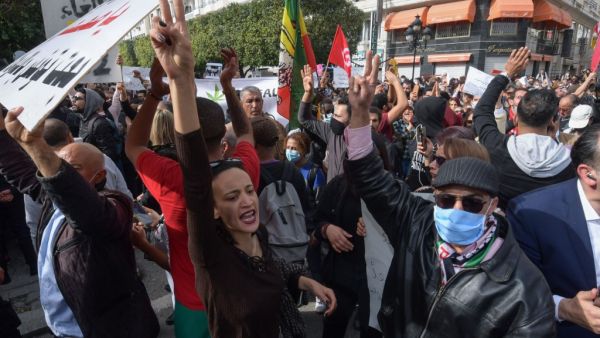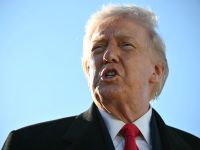Tunisians defied a police lockdown and blocked roads on Saturday to take part in the country’s largest protest in years.
Riot police and security forces cordoned off swaths of Tunis city center and tried to prevent both cars and people from entering the streets around Avenue Habib Bourguiba, but thousands of demonstrators made it through.
Zarzis is also home to a large number of black Tunisians, who constitute between 10 and 15 percent of Tunisia's population.
— Middle East Eye (@MiddleEastEye) February 6, 2021
The country has struggled with racism, as much towards sub-Saharan migrants as its own black population.https://t.co/ep7W3xzbGS
“I lived 10 years in freedom ... I am not ready to lose it,” said protester Haytem Ouslati, 24.
Demonstrators raised placards condemning police violence and chanted: “No fear. The street belongs to the people.”
Another protester, Naima Selmi, said: “We won’t accept Tunisia becoming a barracks. We ask the president to intervene and protect freedoms.”
For the first time in a wave of protests that have spread across Tunisia, Saturday’s rally was backed by the UGTT union, Tunisia’s most powerful political organization with a million members.
While protesters are commemorating the 2013 killing of a prominent activist, worsening living conditions and police brutality are fueling marches in the capitalhttps://t.co/ofA6ESq0GA
— The New Arab (@The_NewArab) February 6, 2021
Union official Samir Cheffi said the protest was needed to protect liberties. “Today is a cry of alarm to defend the revolution, to protect freedoms under threat,” he said.
#Tunisia sees mass protest on anniversary of politician Chokri Belaid’s assassinationhttps://t.co/CoDxxLydMr
— Daily News Egypt (@DailyNewsEgypt) February 6, 2021
The protest took place on the anniversary of the assassination of secular activist and lawyer Chokri Belaid by a hard-line Islamist in February 2013. A decade after Tunisia’s revolution, its political system is mired in endless squabbling between the president, prime minister and parliament while the economy stagnates.
“The people are right to protest because their expectations were high and the economic progress has been slower than they had thought, and then it was exacerbated by the Covid-19 pandemic"
— Middle East Eye (@MiddleEastEye) February 4, 2021
- Rached Ghannouchi
https://t.co/DUvEdxflQl
Protests that began last month over inequality have increasingly focused on the large number of arrests and reports of abuse of detainees, which the government has denied. Demonstrators on Saturday shouted their opposition to the Islamist Ennahda party, which has taken part in successive government coalitions, and chanted the 2011 slogan: “The people want the fall of the regime.”
This article has been adapted from its original source.








